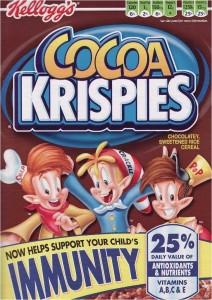Last month, the United States Food and Drug Administration (FDA) posted a request for comments and information regarding food marketing with the intention of revising the current federal guidelines on front-of-pack labeling and nutrition information. This comes only a few months after a successful California lawsuit over health claims made by Kellogg’s that Cocoa Krispies, a sugary breakfast cereal, would boost immunity in children. As a consumer, my suggestions include removing outlandish health claims; labeling all transgenic ingredients and GMO’s; simplification and standardization of descriptive language; and adding consumer directed instructions for proper disposal of food and container waste to minimize environmental impacts.
New guidelines for food packaging should insist that products containing GMO’s be labeled as such, and that all chemical additives be listed according to their exact name, not under the umbrella of “natural and artificial flavors.” Genetically engineered plants, and corn in particular, have demonstrated an ability to reduce biodiversity by contaminating nearby non-GMO fields and breeding in GM suicide genes. Although not perfect, this mutual coercion would prevent the few (shareholders of food companies) from taking advantage of the many (American consumers and taxpayers).
Many of us are unaware of how we are treating nature by purchasing the food that we buy. When a shopper goes to purchase eggs, for instance, there are conventional varieties, vegetarian-fed, free-range, cage-free, organic, biodynamic, and humane certified. Most people who can afford to do so, want to purchase the best quality eggs but are confounded by the differences between these many labels.
Perhaps our factory farms are a reflection of our factory society, where we live in boxes, work in boxes, eat processed food from boxes that is cooked in boxes, watch entertainment from boxes, and sleep in boxes! I propose from this example that the way we treat nature has a direct correlation to the way we treat ourselves, and to evolve past this point in our society, an appropriate first step could be the simplification and standardization of the language used on our food labels so that we are aware of what we are eating and its impact on the environment.
Another question that a conscious consumer might ask is why we label nutrition according only to that which nourishes human beings, since our food pulls from the resources of nature for its production and will have an impact on nature through its disposal. I would like to recommend that food labeling include proper instructions for disposal of food and container waste, through composting, repurposing, and recycling. The front-of-package labeling of environmentally conscious waste disposal would provide an excellent point of education for all consumers.

No comments:
Post a Comment